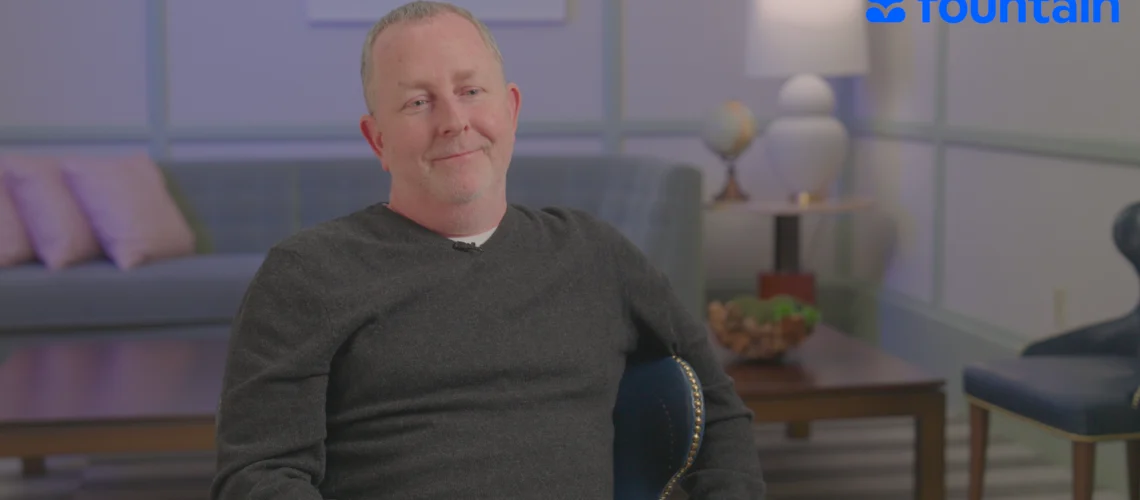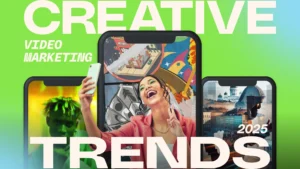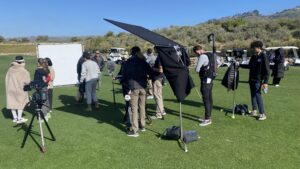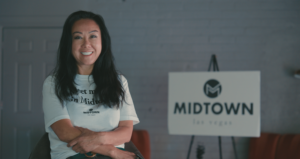FONDU found us via a direct search for video production Las Vegas services. Their client was hosting an annual event in Vegas and wanted to conduct corporate interviews for marketing, as well as build a library of reference videos.
The plan was to interview key players, asking marketing questions like “Why choose Fountain?” or “What makes Fountain’s approach unique?” We set up a Zoom call with FONDU to discuss deliverables, logistics, and budget.
The Zoom call helped address potential challenges during film production Las Vegas. For example, to maintain a consistent look for 10 interviews, we advised avoiding windows in the interview space. The client booked a conference space at Park MGM, just off the Las Vegas Strip.
Here at HUSTL Media we get a lot of requests to film corporate or executive interviews, so we have a pretty good grasp on what to watch out for and how they should look, and we always communicate that to our clients.
Once everything is set, we do final camera prep and get all the gear ready. Another great advantage for the client of going with HUSTL Media is that we keep all the necessary production and film equipment in house, saving client the time and the hassle for needing to source anything else out.
Roll on set
You see a production car filled with camera and lighting equipment.

Once we get into the actual space, the first order of business is to find out how much time we have to set everything up. From camera blocking to setting up lighting and putting in finishing touches everything has to be taken into consideration.
This is for corporate video interviews so the look much be modern, professional, not too moody, pleasing and incorporating company colors to a certain extent.

Preference is always given to shooting lengthwise into the room for maximum depth of field. That creates usually a more pleasing image with more traditional lead lines.
We start off with placing 2 chairs in the room. Then depending on which side the cameras go, the big key light, in this case it’s the Aputure 600D Pro goes onto the opposite side. Notice the 5ft softbox on the key light, usually the larger the soft box or the diffusion, the better the interview talent will look.
On the other side and opposite of the key light in the background goes the hair light. The purpose of the hair light is to separate the subject from the background making him or her pop.
Corporate interviews in Las Vegas or Henderson don’t need moody lighting, so we add a backlight using an Aputure 120D with a softbox and grid to control spill.
Notice also a 3rd light on the left side of the frame shooting into the ceiling. The purpose of that light is to lift up the shadows and bringing the overall light tone of the image up.
So as you can see every light during the interview or actually any sort of a video production has a purpose.

In the reverse angle you can see that there are light tubes placed on the floor as well. Those are to light some parts of the image and upgrade the overall aesthetic of the image.
Final Shot A-Cam

Final Shot B-Cam

So overall there are more considerations that go into filming interviews be it for corporate or entertainment purposes. If you need to shoot interviews in Las Vegas or Henderson Nevada or surrounding areas at least now you know what to expect.
FAQs:
1. What are the key lighting techniques used in corporate interviews?
The key lighting techniques include three-point lighting (key light, fill light, and backlight), soft lighting to reduce shadows, and positioning lights to highlight the subject’s face evenly. These techniques ensure that the interviewee looks clear and well-lit on camera.
2. What equipment is recommended for lighting a corporate interview?
Essential lighting equipment includes softbox lights, LED panels, ring lights, and reflectors. Dimmable lights with adjustable color temperatures are also useful for achieving the perfect look based on the environment and the subject’s skin tone.
3. How can I avoid shadows and harsh lighting on the subject?
To avoid shadows and harsh lighting, use soft light sources, such as softboxes or diffusers, and position the key light at a 45-degree angle from the subject. Use a fill light to reduce any shadows and a backlight to separate the subject from the background, creating a balanced and natural look.
4. What should I consider when lighting an interview in a small space?
When working in a small space, consider using compact and adjustable LED lights that can be easily positioned without cluttering the room. Soft lighting is essential to avoid harsh shadows, and reflectors can be used to bounce light and fill in any dark areas.
5. How does the background affect the lighting setup?
The background plays a significant role in your lighting setup. Avoid overly bright or reflective backgrounds that can distract from the subject. Consider adding a background light or practical lights (like lamps) to add depth and create a more visually appealing scene.
6. What are some common lighting mistakes to avoid?
Common mistakes include placing the key light too close, causing harsh shadows; ignoring the fill light, which can lead to uneven lighting; and neglecting the backlight, which can result in a flat appearance. Ensure lights are properly balanced and adjusted for the subject and environment.
7. Can I achieve professional lighting results on a budget?
Yes, professional lighting results can be achieved on a budget with cost-effective tools like LED panels, softboxes, and reflectors. Focus on creating a soft, even light that flatters the subject and use natural light when available to enhance the setup.
8. What are some tips for lighting virtual interviews?
For virtual interviews, use soft, natural-looking light sources and avoid harsh overhead lighting. Position a key light at a 45-degree angle and a fill light to reduce shadows. If space is limited, consider using ring lights or clip-on LED lights for an even and flattering effect.
To book our services, kindly send us an email at Art@HUSTLMedia.com or directly call us at (702) 980 -9620. You may also learn more about us and our campaigns by visiting our website – HUSTL Media.




